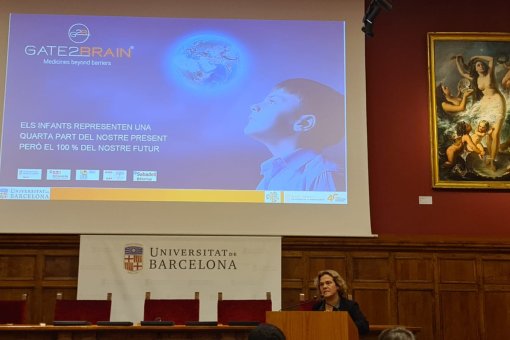Images
Contact

This morning Alicante has started the 100xCiencia.2 meeting, which today and tomorrow brings together the vanguard of Spanish research: the Severo Ochoa and María de Maeztu centers of excellence.
The meeting was opened by Carmen Vela, Secretary of State for Research, Development and Innovation, and she highlighted the importance of approaching science and business.
"Co-creating Value in Scientific Research" is the theme of this meeting that is dedicated to the transfer of scientific knowledge to companies. As highlighted by Salvador Palazón, director of the Valencian Agency for Research and Prospective (AVAP), "Innovation is slowed down in the last stage of the process, the transfer of knowledge from research centers. Without transference there is no innovation and without innovation we are endagenring the future ".
The Secretary of State for Research, Development and Innovation, Carmen Vela, highlighted that the resources put into entities such as the Severo Ochoa and María de Maeztu centers of excellence, "more than an spending are an investment", and expressed their appreciation and gratitude for the extraordinary work that these cutting-edge research centers are doing.
"What we use in research is very well invested and you are doing an excellent job with the limited resources that are put at your disposal. You are 1% of the researchers of the world, but you support 3.2% of the world science and your publications represent 5% of the international scientific community", said Carmen Vela.
The Secretary of State for research noted that the transfer of knowledge between science and business should be a circular concept. "We must be able to use what everyone knows to put it in common, generate knowledge, but also take it to society. You do it very well also with transfer issues, because quality is a call for other sectors to approach", she said in reference to the Centers of Excellence.
For Carmen Vela, research and innovation have to go hand in hand. "With this idea we have tried to break down barriers. We must try to approximate these two sectors, science and business. We must break barriers of thought that still think that companies have to be outside of the University", she said. "As resources are limited, grants now only go to the academic world, and there are no resources for companies, in the private sphere. But I would like to break this, because the research should be funded regardless of where it is done, public or private centers.
Carmen Vela pointed out that in countries like Korea "more than 80% of the dedication to research comes from the business sector. And the most advanced countries science is over 70% dedicated to the private sector. In Spain we have half the doctors in the companies that the rest of the OECD countries. Not all the researchers we train can be devoted to the academic sector. We have to make a circular economy of knowledge, where our scientists also reach companies. "
Co-creation, a new way of innovating
The meeting 100xCiencia.2 consists of three lectures given by three women of recognized international relevance: Krista Keränen, Lita Nelsen and Nuria Oliver.
The inaugural conference was given by Krista Keranen, director of innovation at the Laurea University of Applied Sciences in Finland and an expert in co-creation. Why co-create? Karenen asked himself: "Because the world is constantly changing. And the worst in times of turbulence like this is to continue acting with the logic of past times", said Keranen.
The 'Severo Ochoa' and 'María de Maeztu' accreditations are the highest official recognition of the scientific research granted in Spain. To achieve this accreditation, the centers are selected by an international evaluation committee. These centers and units cover practically all areas of knowledge, from physics and mathematics to the environment and biomedicine.
Recently the 25 centers and the 16 research units accredited with the distinctions "Excellence Severo Ochoa" and "excellence María de Maeztu" have formalized the creation of the Severo Ochoa and María de Maeztu Alliance (SOMMa).
About IRB Barcelona
Created in 2005 by the Generalitat de Catalunya (Government of Catalonia) and University of Barcelona, IRB Barcelona is a Severo Ochoa Centre of Excellence, a seal that was awarded in 2011. The institute is devoted to conducting research of excellence in biomedicine and to transferring results to clinical practice, thus improving people’s quality of life, while simultaneously promoting the training of outstanding researchers, technology transfer, and public communication of science. Its 25 laboratories and seven core facilities address basic questions in biology and are orientated to diseases such as cancer, metastasis, Alzheimer’s, diabetes, and rare conditions. IRB Barcelona is an international centre that hosts 400 employees and 32 nationalities. It is located in the Barcelona Science Park. IRB Barcelona forms part of the Barcelona Institute of Science and Technology (BIST) and the “Xarxa de Centres de Recerca de Catalunya” (CERCA).
IRB Barcelona
L’Institut de Recerca Biomèdica (IRB Barcelona) treballa per aconseguir una vida lliure de malalties. Desenvolupa una recerca multidisciplinària d’excel·lència per curar el càncer i altres malalties vinculades a l'envelliment. Treballa establint col·laboracions amb la indústria farmacèutica i els principals hospitals per fer arribar els resultats de la recerca a la societat a través de la transferència de tecnologia, i du a terme diferents iniciatives de divulgació científica per mantenir un diàleg obert amb la ciutadania. L’IRB Barcelona és un centre internacional que acull al voltant de 400 investigadors de més de 30 nacionalitats. Reconegut com a Centre d'Excel·lència Severo Ochoa des de 2011, és un centre CERCA i membre del Barcelona Institute of Science and Technology (BIST).



